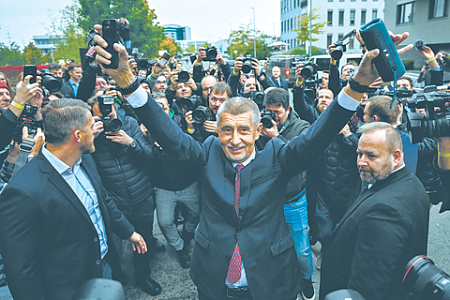
The political landscape in the Czech Republic is undergoing a dramatic transformation, with profound implications for European unity and international relations, particularly concerning the ongoing conflict in Ukraine. Three weeks after the parliamentary elections, President Petr Pavel formally tasked Andrej Babiš, the leader of the victorious ANO party, with forming a new government. However, the process has been fraught with delays, as Babiš navigates complex coalition negotiations and significant personal legal challenges.
Despite his party, ANO, securing 80 out of 200 seats – making it the largest parliamentary faction – Babiš lacks an outright majority. This necessitates forging alliances, and his emerging partners are the anti-immigrant Freedom and Direct Democracy (SPD) party and the fiscally conservative Motoristé sobě (Motorists Together). These three entities share a critical stance on several European Union policies, including migration and environmental regulations, and crucially, express skepticism or outright opposition to continued substantial aid for Kyiv. Together, they command a parliamentary majority of 108 seats, enough to form a stable government.
The protracted negotiations have left the country in a state of political limbo. While the elections took place on October 3rd and 4th, the outgoing government of Prime Minister Petr Fiala will only formally resign in early November, coinciding with the inaugural session of the Chamber of Deputies. This timeline pushes the definitive confirmation of Babiš’s cabinet by President Pavel potentially into mid-December, as he himself hopes to finalize the intricate web of agreements and ministerial appointments by then. The proposed cabinet structure allocates eight ministerial portfolios, plus the premiership, to ANO, with Motoristé sobě securing four and SPD three. Notably, the leadership of the SPD, Tomio Okamura, known for his vocal opposition to Czech membership in NATO and the EU, is slated for the influential position of Speaker of the Chamber of Deputies, signaling a significant ideological shift in the country’s legislative leadership.
Beyond the political horse-trading, Babiš faces substantial personal hurdles. His ownership of Agrofert, one of the Czech Republic’s largest agro-industrial conglomerates, presents a conflict of interest under national law. Should he assume the premiership, he would have a mere month to resolve this issue. Analysts, such as Ladislav Kabada, a Czech political scientist, highlight the complexity: selling such a vast holding in 30 days is improbable, waiving all subsidies for Agrofert would be economically disadvantageous, and the establishment of a “blind trust” – a mechanism for independent management – remains unprecedented in the Czech legal framework.
Nevertheless, experts like Mikhail Vedernikov from the Russian Academy of Sciences’ Institute of Europe suggest that Babiš remains in a commanding position, buoyed by strong electoral support. The coalition, despite its ideological breadth, is anticipated to be robust due to the partners’ shared ambition for power and their congruent views on key issues. Vedernikov notes a tempering of previous radical stances, such as SPD’s calls for referendums on NATO and EU withdrawal, indicating a pragmatic alignment. However, a potential challenge lies in maintaining the enthusiasm of their anti-establishment electorate once these parties transition from opposition to governance.
Internationally, this Czech political development has resonated strongly, particularly in Hungary. Prime Minister Viktor Orbán has openly expressed hopes for closer ties with Prague and Bratislava, with the explicit aim of forming an alliance within the European Union that is skeptical of, or opposed to, further support for Ukraine. His chief political advisor, Balázs Orbán, confirmed this strategic objective.
The incoming coalition in Prague indeed views the revitalization of the Visegrad Group (V4), comprising Poland, Slovakia, Hungary, and the Czech Republic, as a priority in its foreign policy agenda. This regional bloc has been fractured in recent years, primarily due to differing approaches to the Russia-Ukraine conflict. While Poland and the previous Czech government were staunch supporters of Kyiv, Hungary and, more recently, Slovakia, have adopted more critical or neutral stances toward the EU’s pro-Ukrainian policies. The prospect of Prague now aligning with Budapest and Bratislava could fundamentally alter the V4’s dynamics, potentially creating a significant internal bloc within the EU that challenges the prevailing consensus on Ukraine, reshaping the geopolitical landscape of Central Europe.
